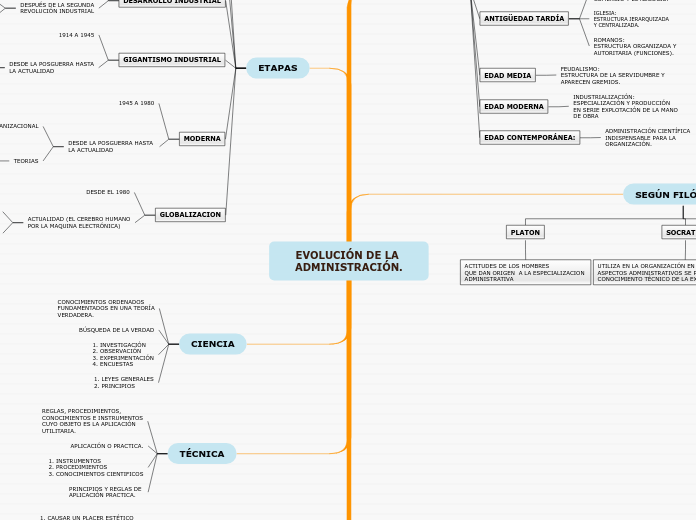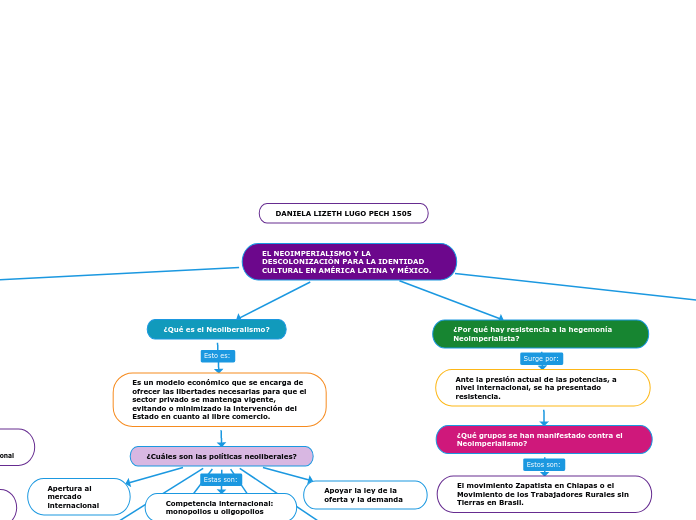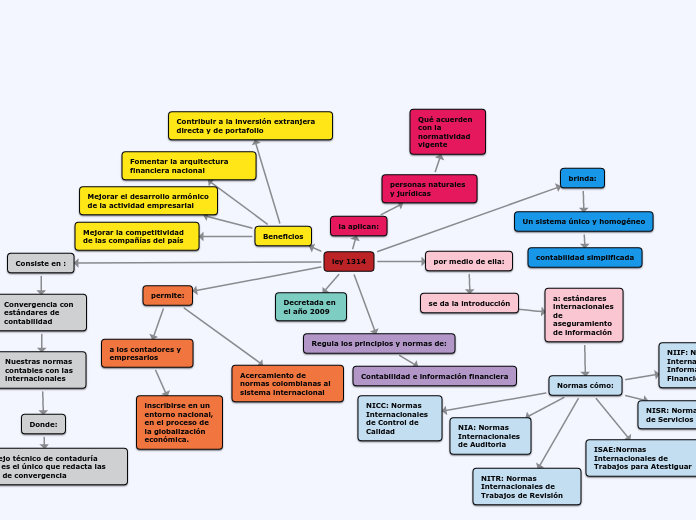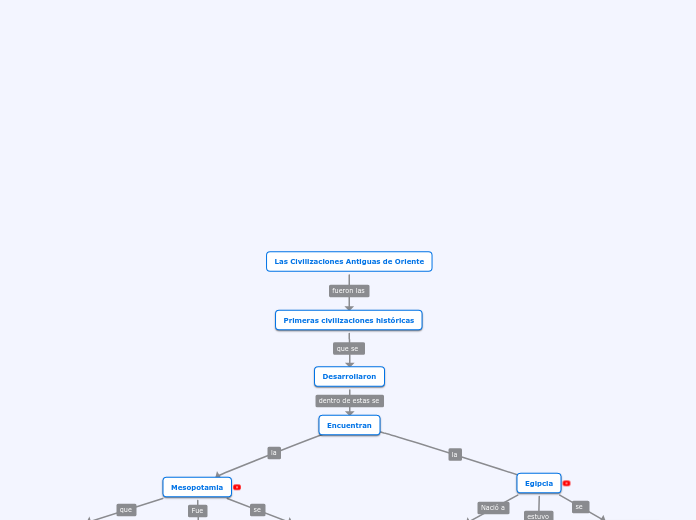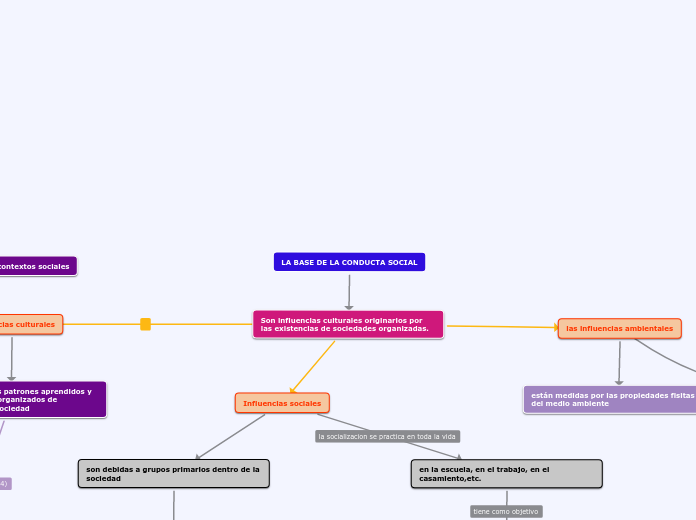EVOLUCIÓN DE LA ADMINISTRACIÓN.
Name the problem
Identify the problem or issue in a few words and press Enter. This will become the title of your map.
ARTE
REGLAS
1. TÉCNICAS
2. TEORÍAS
3. EMOTIVIDAD
4. CREATIVIDAD
1. BELLEZA
2. HABILIDAD
3. EXPRESIÓN
1. CAUSAR UN PLACER ESTÉTICO
A TRAVÉS DE TÉCNICAS Y TEORÍAS
2. VIRTUD Y HABILIDAD PARA
UNA COSA
Add a statement describing the problem as if it were a person.
- What does the world look like from the problem's perspective?
- How does it respond in certain situations?
- What does it like or not like?
- What weaknesses does it look for in people or situations?
- What weaknesses does it have that make it vulnerable?
- How does it help other people and support their goals?
TÉCNICA
PRINCIPIOS Y REGLAS DE
APLICACIÓN PRACTICA.
1. INSTRUMENTOS
2. PROCEDIMIENTOS
3. CONOCIMIENTOS CIENTIFICOS
APLICACIÓN O PRACTICA.
REGLAS, PROCEDIMIENTOS,
CONOCIMIENTOS E INSTRUMENTOS
CUYO OBJETO ES LA APLICACIÓN
UTILITARIA.
What is 'EVOLUCIÓN DE LA ADMINISTRACIÓN.' like?
- Have similar problems or similar causes been seen in other places?
- What would it look like if you imagined the same problem in a completely different situation?
For example, how would the problem behave at a wedding, at a concert, in a supermarket, or underwater?
CIENCIA
1. LEYES GENERALES
2. PRINCIPIOS
1. INVESTIGACIÓN
2. OBSERVACIÓN
3. EXPERIMENTACIÓN
4. ENCUESTAS
BÚSQUEDA DE LA VERDAD
CONOCIMIENTOS ORDENADOS
FUNDAMENTADOS EN UNA TEORÍA
VERDADERA.
Who is affected?
Type in a name or role of someone who is affected by 'EVOLUCIÓN DE LA ADMINISTRACIÓN.'
ETAPAS
GLOBALIZACION
ACTUALIDAD (EL CEREBRO HUMANO
POR LA MAQUINA ELECTRÓNICA)
TEORÍA
SITUACIONAL
ÉNFASIS
EN EL AMBIENTE
Who does not cause 'EVOLUCIÓN DE LA ADMINISTRACIÓN.'?
- Are there people or users who manage to avoid this problem?
- Are they doing something different to everyone else?
DESDE EL 1980
Who causes 'EVOLUCIÓN DE LA ADMINISTRACIÓN.'?
- Is there any connection with certain people or users?
- Are they doing something different to everyone else?
MODERNA
DESDE LA POSGUERRA HASTA
LA ACTUALIDAD
1. NEOCLASICA
2. DE LA BUROCRACIA
3. ESTRUCTURALISTA
4. DEL COMPORTAMIENTO
5. SITUACIONAL
ESTRUCTURA ORGANIZACIONAL
Where does 'EVOLUCIÓN DE LA ADMINISTRACIÓN.' not happen?
- Are there locations or places where the problem does not happen?
- Are there locations where it should happen but doesn't?
1. EN LAS PERSONAS
2. EN LA TECNOLOGÍA
3. EN EL AMBIENTE
1945 A 1980
Where does 'EVOLUCIÓN DE LA ADMINISTRACIÓN.' happen?
- Is there any connection with locations or places?
GIGANTISMO INDUSTRIAL
DESDE LA POSGUERRA HASTA
LA ACTUALIDAD
TEORIAS
1. CLÁSICA
2. NEOCLASICA
3. DE LAS RELACIONES HUMANAS
ESTRUCTURA ORGANIZACIONAL
DE LAS PERSONAS
How does 'EVOLUCIÓN DE LA ADMINISTRACIÓN.' not happen?
- How do you know when the problem is not happening?
- Could the problem actually not be happening, when you think it is?
- Is it really there all the time?
1914 A 1945
How does 'EVOLUCIÓN DE LA ADMINISTRACIÓN.' happen?
- How does the problem appear?
- How do you know the problems is happening?
- Could it be happening when you are not aware of it?
DESARROLLO INDUSTRIAL
DESPUÉS DE LA SEGUNDA
REVOLUCIÓN INDUSTRIAL
TEORÍAS
ADMINISTRACIÓN CIENTÍFICA
ENFASIS
When does 'EVOLUCIÓN DE LA ADMINISTRACIÓN.' not happen?
- Are there times when this problem does not happen?
- Are there times when according to theory, it should happen, but it doesn't?
- If it is intermittent, when does it start working again?
EN LAS TAREAS
1860 A 1914
When does 'EVOLUCIÓN DE LA ADMINISTRACIÓN.' happen?
- Is there any connection with dates, times or other events?
- Is it something that was working once, and has stopped working?
TRANSICION HACIA
LA INDUSTRIALIZACION
PRIMERA REVOLUCIÓN
INDUSTRIAL
1780 1860
Why is 'EVOLUCIÓN DE LA ADMINISTRACIÓN.' a problem?
ARTESANAL
DESDE LA ANTIGÜEDAD
ANTES DE LA REVOLUCIÓN
INDUSTRIAL
HASTA EL 1780
What causes 'EVOLUCIÓN DE LA ADMINISTRACIÓN.'?
- What causes or triggers this problem?
- Are there situations or conditions that are not expected to cause it, but do somehow?
SEGÚN FILÓSOFOS
PERICLES
UNOS DE OS PRINCIPIOS BÁSICOS
DE LA ADMINISTRACIÓN QUE SE REFIERE
A LA SELECCIÓN DE PERSONAL.
SOCRATES
UTILIZA EN LA ORGANIZACIÓN EN LOS
ASPECTOS ADMINISTRATIVOS SE PARANDO EL CONOCIMIENTO TÉCNICO DE LA EXPERIENCIA.
PLATON
ACTITUDES DE LOS HOMBRES
QUE DAN ORIGEN A LA ESPECIALIZACION
ADMINISTRATIVA
CIVILIZACIONES
EDAD CONTEMPORÁNEA:
ADMINISTRACIÓN CIENTÍFICA
INDISPENSABLE PARA LA
ORGANIZACIÓN.
EDAD MODERNA
INDUSTRIALIZACIÓN:
ESPECIALIZACIÓN Y PRODUCCIÓN
EN SERIE EXPLOTACIÓN DE LA MANO
DE OBRA
EDAD MEDIA
FEUDALISMO:
ESTRUCTURA DE LA SERVIDUMBRE Y
APARECEN GREMIOS.
ANTIGÜEDAD TARDÍA
ROMANOS:
ESTRUCTURA ORGANIZADA Y
AUTORITARIA (FUNCIONES).
IGLESIA:
ESTRUCTURA JERARQUIZADA
Y CENTRALIZADA.
VENECIANOS:
MARCO LEGAL PARA EL
COMERCIO Y EL NEGOCIO.
GRIEGOS
(500-200 AC)
ÉTICA DEL TRABAJO Y
UNIVERSALIDAD DE LA
ADMINISTRACIÓN.
CHINOS
(500 AC)
BASES DEL BUEN GOBIERNO
BABILÓNICOS
(2000 1700 AC)
ESTÁNDARES SALARIOS
OBLIGACIONES Y LEYES.
EGIPCIOS
(4000-2000 AC)
INVENTARIOS, BUROCRACIA,
PROYECCIONES Y PLANEACION.
HEBREOS
(4000 AC)
TRAMOS CONTROL, DIRECCIÓN
POR PATRIARCAS.
SUMERIOS
(5000 AC)
Add an assumption
Identify an assumption you are making in both the description of the problem and the logical solution.
- What would happen if the assumption changed?
- What if the assumption is not valid?
- Might different assumptions also apply?
REGISTROS ESCRITOS:
COMERCIAL Y GUBERNAMENTAL.
